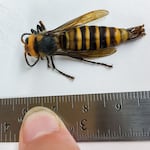
A file photo of a male Asian giant hornet found in Washington.
WSDA
Wildlife officials in Washington state have said British Columbia and U.S. federal and state agencies will work together to track, trap and eradicate Asian giant hornets in the Pacific Northwest.
The Asian giant hornet species was first spotted in Washington state in 2019 and agencies have since been on the hunt for the invasive hornets. They kill bees and take bee larvae to feed their own young.
The Washington State Department of Agriculture announced Monday that the agencies made international plans this year similar to the state's response last year, including public outreach, reporting and trapping, KING-TV reported Monday.
A hornets nest was discovered and eradicated in October 2020 in Washington state's Whatcom County. Experts believe there are more nests in the region and will focus traps in the county. Whatcom County is about 55 miles (88 kilometers) south of Vancouver in Canada's province of British Columbia.
The Washington state agency will continue using orange juice and rice cooking wine in traps this year, while citizens can use either orange juice or a brown sugar-based bait, officials said. Residents in Whatcom, Skagit, San Juan, Island, Jefferson, and Clallam counties have been encouraged to make their own traps starting in July.
Half of the confirmed reports of the species in the state last year and all of the reports about the hornets in British Columbia came from members of the public, a report said.
A hornet surveillance program in British Columbia will set up traps in areas where there were previous findings and keep up outreach with beekeepers and partner agencies, officials said.
Washington State University, the U.S. Department of Agriculture Animal, Plant, and Health Inspection Service and the federal Agricultural Research Service are also conducting research to support hornet detection and eradication efforts.